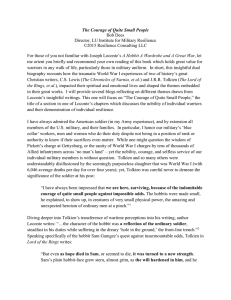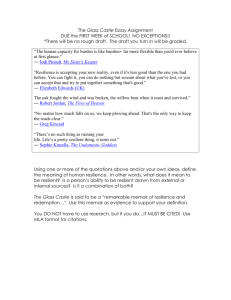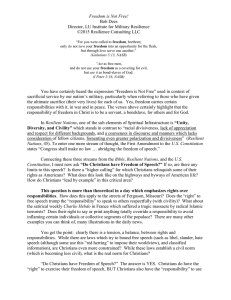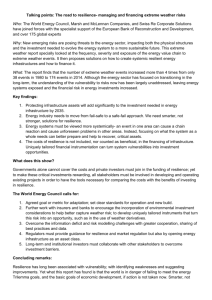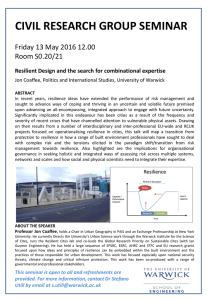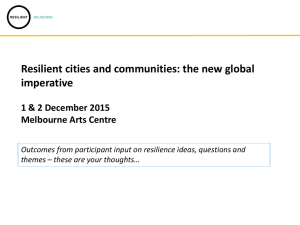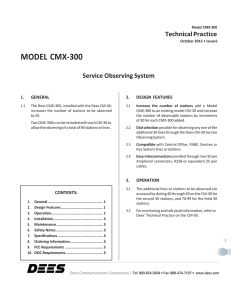When Technology and Morality Part Ways Bob Dees ©2015 Resilience Consulting LLC
advertisement
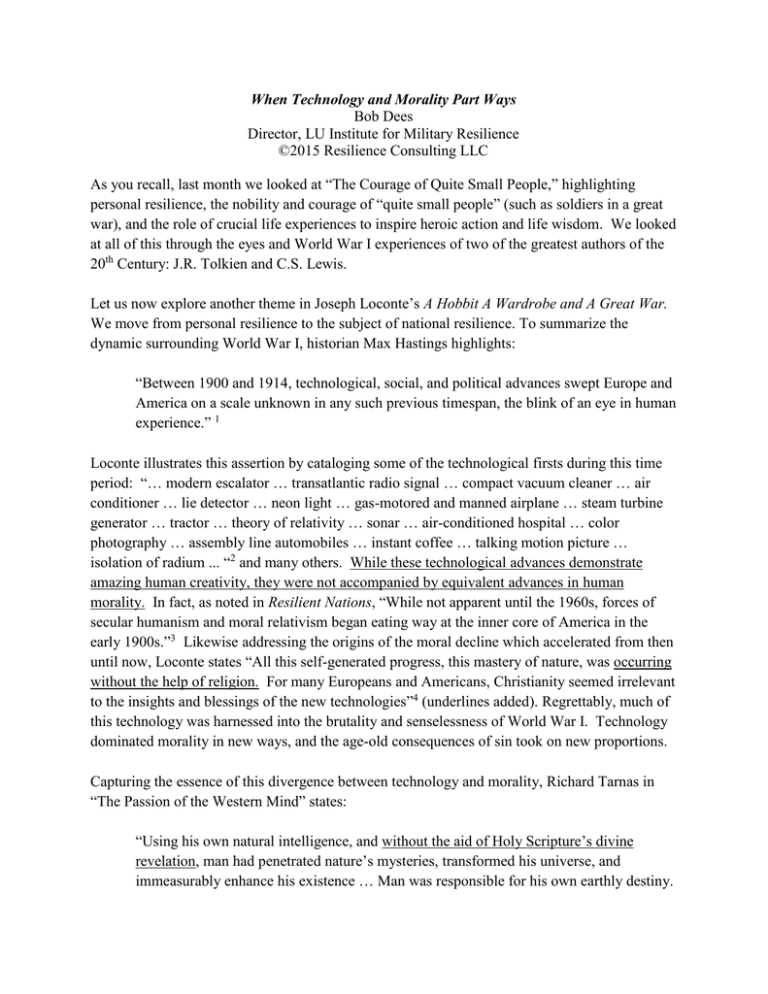
When Technology and Morality Part Ways Bob Dees Director, LU Institute for Military Resilience ©2015 Resilience Consulting LLC As you recall, last month we looked at “The Courage of Quite Small People,” highlighting personal resilience, the nobility and courage of “quite small people” (such as soldiers in a great war), and the role of crucial life experiences to inspire heroic action and life wisdom. We looked at all of this through the eyes and World War I experiences of two of the greatest authors of the 20th Century: J.R. Tolkien and C.S. Lewis. Let us now explore another theme in Joseph Loconte’s A Hobbit A Wardrobe and A Great War. We move from personal resilience to the subject of national resilience. To summarize the dynamic surrounding World War I, historian Max Hastings highlights: “Between 1900 and 1914, technological, social, and political advances swept Europe and America on a scale unknown in any such previous timespan, the blink of an eye in human experience.” 1 Loconte illustrates this assertion by cataloging some of the technological firsts during this time period: “… modern escalator … transatlantic radio signal … compact vacuum cleaner … air conditioner … lie detector … neon light … gas-motored and manned airplane … steam turbine generator … tractor … theory of relativity … sonar … air-conditioned hospital … color photography … assembly line automobiles … instant coffee … talking motion picture … isolation of radium ... “2 and many others. While these technological advances demonstrate amazing human creativity, they were not accompanied by equivalent advances in human morality. In fact, as noted in Resilient Nations, “While not apparent until the 1960s, forces of secular humanism and moral relativism began eating way at the inner core of America in the early 1900s.”3 Likewise addressing the origins of the moral decline which accelerated from then until now, Loconte states “All this self-generated progress, this mastery of nature, was occurring without the help of religion. For many Europeans and Americans, Christianity seemed irrelevant to the insights and blessings of the new technologies”4 (underlines added). Regrettably, much of this technology was harnessed into the brutality and senselessness of World War I. Technology dominated morality in new ways, and the age-old consequences of sin took on new proportions. Capturing the essence of this divergence between technology and morality, Richard Tarnas in “The Passion of the Western Mind” states: “Using his own natural intelligence, and without the aid of Holy Scripture’s divine revelation, man had penetrated nature’s mysteries, transformed his universe, and immeasurably enhance his existence … Man was responsible for his own earthly destiny. His own wits and will could change his world. Science gave man a new faith – not only in scientific knowledge, but in himself”5 (underlines added). So what is the point? The seeds of our nation’s moral decline in the 20th Century and beyond were creativity without constraints, machinery without morality, and relativity without religion. When left to his own devices, man always degenerates to his base and selfish nature. There are many Scriptures which validate this, and history attests to this truth in the lives of individuals and in the lives of nations. When we walk away from God, we walk away from true and lasting morality. When we promote self to a god in which we place ultimate faith, we sacrifice the moral compass which is essential to the responsible handling of powerful technology and legitimate authority. This has disastrous consequences for individuals, families, and nations. Our beloved America is not exempt from this reality. We have forgotten God. We have glorified self. We have walked away from the wisdom of His Holy Scriptures. We are now bearing the consequences. From Resilient Nations, have you ever thought of an America without God? “What if business leaders and investors across America only had their bank accounts to trust in during the early days of the Great Recession in 2008? Or what if American military members in harm’s way could not draw courage from a God to guide and protect them? Or what if the military chaplain were not present to provide God’s comfort to the grieving parents or widow or children of a fallen soldier? What would the citizens of New Orleans, or the residents of New Jersey, have done as their homes and hopes were washed away by Hurricane Katrina and Superstorm Sandy? Who would they have prayed to? Where would they have received the compassionate care supplied by thousands of churches? Where would the parents of Sandy Hook school shooting victims have received solace? Perhaps you have an even more relevant example in your own life. Where would you, and your family, and your future generations be without a merciful, compassionate, protective, and sovereign God in your lives, or in America? The alternative is grim and depressing. Less God, more government. Less compassion, more control. Less grace, more law. Less morality, more deviancy. Less peace, more violence. Less love, more hate. Do you really want this kind of a future for yourself and your loved ones? Do we really want this kind of a future for America? Yet there is HOPE.”7 “13 If I shut up the heavens so that there is no rain, or if I command the locust to devour the land, or if I send pestilence among My people (or if My Nation turns its back on me and becomes morally depraved), 14 and My people who are called by My name humble themselves and pray and seek My face and turn from their wicked ways, then I will hear from heaven, will forgive their sin and will heal their land.”6 (underlines and paraphrase added) May it be so, America! 1 Hastings, Max, Catastrophe 1914: Europe Goes to War, New York: Alfred, A Knopf, 2013, page 548. Loconte, Joseph. A Hobbit A Wardrobe And A Great War, Nashville, TN: Nelson Books, 2015, page 11. 3 Dees, Robert F. Resilient Nations, San Diego, CA: Creative Team Publishers, 2014, page 47. 4 Loconte, page 12. 5Tarnas, Richard. The Passion of the Western Mind, New York: Ballantine Books, 1991, page 12. 6 New American Standard Bible, 2 Chronicles 7:13,14. 7 Dees, pages 363-365. 2 Put on your thinking cap. Tell us what you think about this latest Resilience Blog! www.Facebook.com/LUMilitaryAffairs Respectfully in Christ, Bob Bob Dees LU Institute for Military Resilience www.LUOnline.com/IMR ------------------------------------------------0---------------------------------------------------------- The next Institute for Military Resilience (IMR) Webinar will be Honor to Whom Honor is Due Major General Bob Dees, U.S. Army, Retired Director, Liberty University Institute for Military Resilience 8 PM on Thursday, November 12, 2015 Join us for this very special webinar, hosted by Major General Robert F. Dees (U.S. Army Retired), as we celebrate and honor service members, veterans, and military families through the sharing of personal testimonials and stories from our Liberty University military family. Don't forget to RSVP to confirm your attendance. This is one event you will not want to miss! Have a loved one you would like to honor for their service and sacrifice? See you there for a powerful time of unique insights Visit www.Liberty.edu/IMRWebinars for information on howinto to submit a story for consideration to be shared in this webinar. Honor to Whom Honor is Due Register at www.Liberty.edu/IMRWebinars
